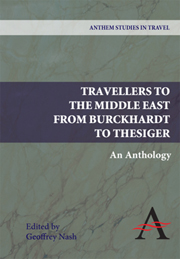Book contents
- Frontmatter
- Contents
- Acknowledgements
- Introduction
- PART ONE THE COMING OF EMPIRE 1800–1879
- PART TWO COLONIALISM AND RESISTANCE 1880–1950
- Ottoman and Former Ottoman Territories
- 1 A Wandering Scholar in the Levant
- 2 Dar-ul-Islam
- 3 Turkey in Revolution
- 4 An Englishwoman in a Turkish Harem
- 5 Three Deserts
- 6 Letters from Palestine, 1932–1936
- Arabia
- Persia/Iran
- Bibliography
6 - Letters from Palestine, 1932–1936
from Ottoman and Former Ottoman Territories
Published online by Cambridge University Press: 05 March 2012
- Frontmatter
- Contents
- Acknowledgements
- Introduction
- PART ONE THE COMING OF EMPIRE 1800–1879
- PART TWO COLONIALISM AND RESISTANCE 1880–1950
- Ottoman and Former Ottoman Territories
- 1 A Wandering Scholar in the Levant
- 2 Dar-ul-Islam
- 3 Turkey in Revolution
- 4 An Englishwoman in a Turkish Harem
- 5 Three Deserts
- 6 Letters from Palestine, 1932–1936
- Arabia
- Persia/Iran
- Bibliography
Summary
Born into a family of academics – his grandfather was Master of Balliol and his father Provost of Queen's College, Oxford – Thomas graduated from Balliol in 1932. Deciding against an academic career he applied for the colonial service but instead of Palestine, his preference, was offered a post in the Gold Coast. Later an esteemed historian of Africa, Hodgkin opted to travel to Palestine as an unpaid assistant on an archaeological project at Jericho. His period as an archaeology student between January 1932 and July 1933 was unsuccessful career-wise, but he used it to travel around Palestine and parts of Syria and Transjordan. In May 1934 he was back as a cadet in the Palestine civil service. Hodgkin's political views were formed out of the maelstrom of events in the 1930s. Siding with the Left and opposed to imperialism he soon found it unconscionable to be involved in the British suppression of the Palestinian Arab revolt, which began in 1936 and which he supported. He resigned leaving Palestine in the summer of 1936. Edited by his brother E.C. Hodgkin, Letters from Palestine 1932–36 was published only in 1986. Unlike Duff Gordon's Letters from Egypt or Bell's Persian Letters, Hodgkin's letters were not intended for publication and so remain unpolished.
From:
Letters from Palestine 1932–36 (1986)
Rather like the young Disraeli's Home Letters (Lothair and Tancred were actually fresh in Thomas' mind when he wrote them) these letters display qualities of vivid immediacy and youthful effervescence.
- Type
- Chapter
- Information
- Travellers to the Middle EastAn Anthology, pp. 176 - 184Publisher: Anthem PressPrint publication year: 2009



